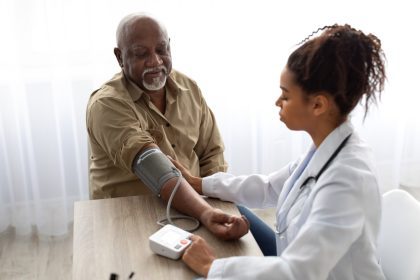High blood pressure often develops silently, earning its reputation as a dangerous yet stealthy health condition. While early stages might show no obvious symptoms, certain warning signs can indicate dangerously elevated levels. Medical experts emphasize that recognizing these signals early could prevent life-threatening complications and lead to timely intervention.
The persistent headache pattern
Frequent headaches, particularly those characterized by throbbing sensations or pressure behind the eyes, often signal elevated blood pressure. These headaches develop when excessive pressure strains blood vessels in the brain, creating persistent discomfort that differs from typical tension headaches. The pain often feels more intense in the morning and may worsen with physical activity or stress.
Medical professionals note that while not every headache indicates high blood pressure, patterns of recurring pain, especially when accompanied by other symptoms, warrant immediate medical attention. The relationship between headaches and blood pressure often reveals itself through timing and intensity. Patients frequently describe these headaches as different from their usual patterns, with a distinctive pressure sensation that becomes more pronounced over time.
Respiratory distress signals
Shortness of breath during normal activities often indicates cardiovascular strain. When blood pressure remains elevated, the heart works harder to pump blood, potentially leading to heart failure or pulmonary hypertension. This increased workload manifests through breathing difficulties during routine tasks that previously caused no distress.
The progression of breathing problems often starts subtly. Individuals might notice they need to pause during regular activities like climbing stairs or walking short distances. As the condition advances, even mild exertion can trigger breathlessness. Nighttime breathing difficulties may also develop, with some people requiring additional pillows to sleep comfortably or experiencing sudden breathlessness that awakens them from sleep.
Visual disruptions
The delicate blood vessels in the eyes prove particularly vulnerable to pressure changes. Hypertensive retinopathy occurs when sustained high blood pressure damages these vessels, potentially leading to permanent vision loss without intervention. The damage often develops gradually, but changes in vision may appear suddenly.
Early warning signs might include momentary blurring, difficulty focusing on close work, or occasional spots in the visual field. These symptoms may come and go initially, making them easy to dismiss. However, as blood pressure remains elevated, the visual changes become more persistent and noticeable. Any sudden change in vision requires immediate medical evaluation to prevent permanent damage.
Cardiac warning signs
Chest discomfort represents one of the most serious indicators of blood pressure problems. This pain, often described as pressure or tightness, might signal reduced blood flow to the heart muscle. The sensation may radiate to the arms, neck, or jaw, and frequently accompanies physical exertion or emotional stress.
Medical professionals emphasize that chest pain requires immediate medical evaluation to rule out heart attack or other severe cardiovascular conditions. The pain pattern may vary among individuals, but any persistent or recurring chest discomfort warrants prompt attention, particularly when combined with other symptoms of high blood pressure.
Cognitive effects
Mental clarity often suffers when blood pressure reaches dangerous levels. Sustained high pressure can affect brain function by reducing oxygen delivery and damaging small blood vessels throughout the brain tissue. This damage may manifest as difficulty concentrating, problems with memory, or general mental fogginess.
Over time, uncontrolled high blood pressure increases the risk of cognitive decline and dementia. Individuals might notice increasing difficulty with complex tasks, problems maintaining focus during conversations, or unusual forgetfulness. These changes often develop gradually but can significantly impact daily functioning and quality of life.
Nasal hemorrhage concerns
While occasional nosebleeds occur naturally, frequent episodes might indicate cardiovascular stress. High blood pressure can weaken blood vessel walls throughout the body, including those in the nasal passages, making them more prone to rupture. These nosebleeds often occur spontaneously and may be more difficult to stop than typical nosebleeds.
Regular nosebleeds, particularly when combined with other symptoms, should prompt medical evaluation. This symptom often provides an early warning of pressure-related blood vessel damage throughout the body, not just in the nasal area.
Cardiac rhythm disruptions
An irregular heartbeat, medically termed arrhythmia, sometimes develops as blood pressure rises. Individuals might notice heart palpitations, a sensation of skipped beats, or periods of rapid heartbeat. These rhythm changes can occur at rest or during activity and may accompany feelings of anxiety or lightheadedness.
Prevention and monitoring
Managing blood pressure requires consistent attention and proactive measures. Regular monitoring helps track pressure changes over time, with normal adult readings typically falling below 120/80 mmHg. Home monitoring devices provide valuable data between medical visits, helping identify patterns and triggers that affect blood pressure levels.
Lifestyle modifications play a crucial role in prevention. Regular physical activity, maintaining a healthy weight, and managing stress all contribute to better blood pressure control. Dietary changes, particularly reducing sodium intake and increasing consumption of fruits and vegetables, can significantly impact blood pressure levels.
Medical intervention and outlook
Professional medical care remains essential for managing high blood pressure. Healthcare providers can develop comprehensive treatment plans that may include medication, lifestyle modifications, and regular monitoring. Early intervention significantly improves outcomes and helps prevent serious complications like heart attack, stroke, and kidney damage.
Understanding and responding to blood pressure symptoms helps prevent life-threatening complications. Regular medical check-ups, combined with attention to warning signs and lifestyle modifications, create the foundation for long-term cardiovascular health and overall well-being.
This story was created using AI technology.







